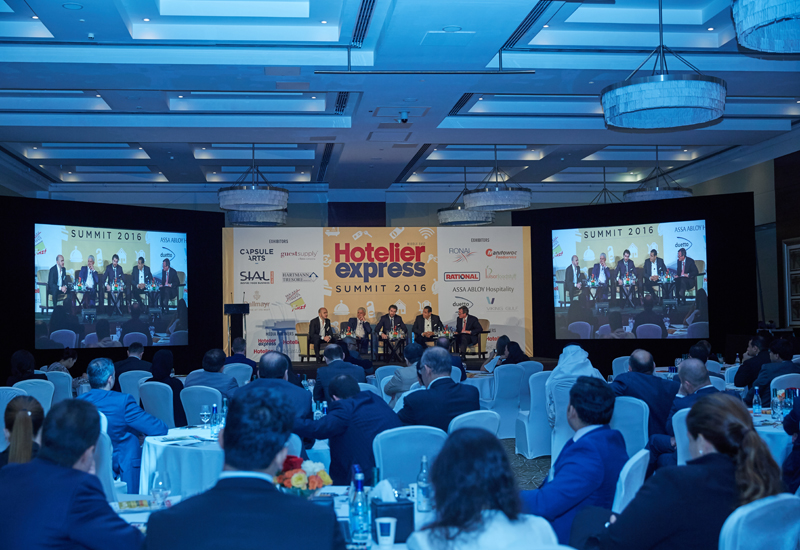UAE hotel demand will outpace supply by 2020
09.05 Sector overview: Accommodating Growth in the Middle East by STR client relationships director - Sarah Duignan
Hotel demand will outpace supply by 2020, according to STR client relationships director Sarah Duignan. The data was shared at the “accommodating growth in the Middle East” sector overview presentation at the Hotelier Express Summit 2016, held in Dubai. RevPAR levels had peaked in October 2009 at AED1,300 (US $353.9) and now current average rates are at AED 560 ($152.4) over the last 12 months. What are the current market conditions? The supply currently outpaces demand in the region. There are 10,202 additional rooms due to open in Dubai before the end of 2016. “According to STR data, supply continues to increase in the Middle East/Africa region (+2.9% in Q2 2016 compared with Q2 2015). This, in combination with a -4.0% drop in demand, resulted in declines across all KPIs for the region,” Duignan said. The data shows that this downward hotel performance trend will continue over the next few years, until demand growth resumes in the run-up to Expo 2020. However despite the downward trend, the data also shows that the Middle East is the biggest growth market for new hotels as a percentage of existing supply.
STR’s October 2016 Pipeline Report shows 158,714 rooms in 554 projects under contract in the Middle East and 57,740 rooms in 310 projects under contract in Africa. Among key markets in the Middle East and Africa, Makkah, Saudi Arabia (24,090 rooms in 15 projects), reported the most rooms in construction. Dubai, United Arab Emirates (19,687 rooms in 67 hotels), was the only other market to report more than 10,000 rooms in construction. “Low oil prices, currency volatility, supply increases and safety concerns (in some countries) still continue to affect the Middle East and Africa’s hotel performance,” Duignan added. So what does the future hold? By 2020, the demand for hotel rooms will outstrip supply, said Duignan. According to data predictions, by 2017 occupancy levels and supply to be very strong. While there will be some growth in 2018 with the focus on Expo 2020 but the biggest growth will be in 2021, according to STR’s November forecast.
Airbnb to further disrupt ME mid-market progress
09.25 Panel discussion: Alternative Accommodation – Competing with Disruptors
A panel of hospitality experts gathered at the Hotelier Express Summit 2016 for a controversial discussion of the impacts Airbnb will have on the future growth of the budget, mid-market and serviced apartment sectors in the Middle East
The Hotelier Express Summit hosted a panel discussion on the topic of alternative accommodation, in which Airbnb became a focus of attention, with hoteliers presenting opposing opinions regarding the seriousness of the impacts the new hospitality platform presents.
Time Hotels CEO Mohamed Awadalla said: “Airbnb is very nice, but it’s a totally different offering, I have realised they are no threat, their guests are not looking for our rooms, they look for a different product – we have facilities, security and F&B, it’s a different market. It doesn’t scare me.”
Citymax Hotels COO Russell Sharpe disagreed: “If you are not worried [about Airbnb], you are wrong. Airbnb as a company is valued at US $25 billion, their revenues are in excess of $1 billion, boasting 60 million guests. They will tell you that they own those 60 million [guests], it is their list, and they believe they will all come back and book again.” He added that the online booking platform has also shown 350% growth year-on-year, adding these figures are ‘scary’,
Smartotels founder and managing partner Tarek Daouk said: “With Airbnb, what is important to understand is the purpose of the trip and the length of stay, it’s all about why the guests are travelling. For example, in London if you want a specific neighbourhood, Airbnb could be more favourable [than a budget or mid-market hotel], this is important to keep in mind.” Roda Hotels & Resorts corporate vice president of strategy & development Louay Sarrage commented: “I’d say some segments are competing with Airbnb, like serviced apartments. But, if a guest is travelling with a maid and children, they need three or four rooms, so a serviced apartment makes more sense. However, millennials don’t care as much about service, and they don’t want to pay extra. Whereas a businessperson doesn’t think of Airbnb at all, he can’t take a risk [on accommodation], and besides, the company may be paying for the business trip.” He concludes: “Yes Airbnb is competition, but is not black and white.”

| Advertisement |










 Search our database of more than 2,700 industry companies
Search our database of more than 2,700 industry companies









